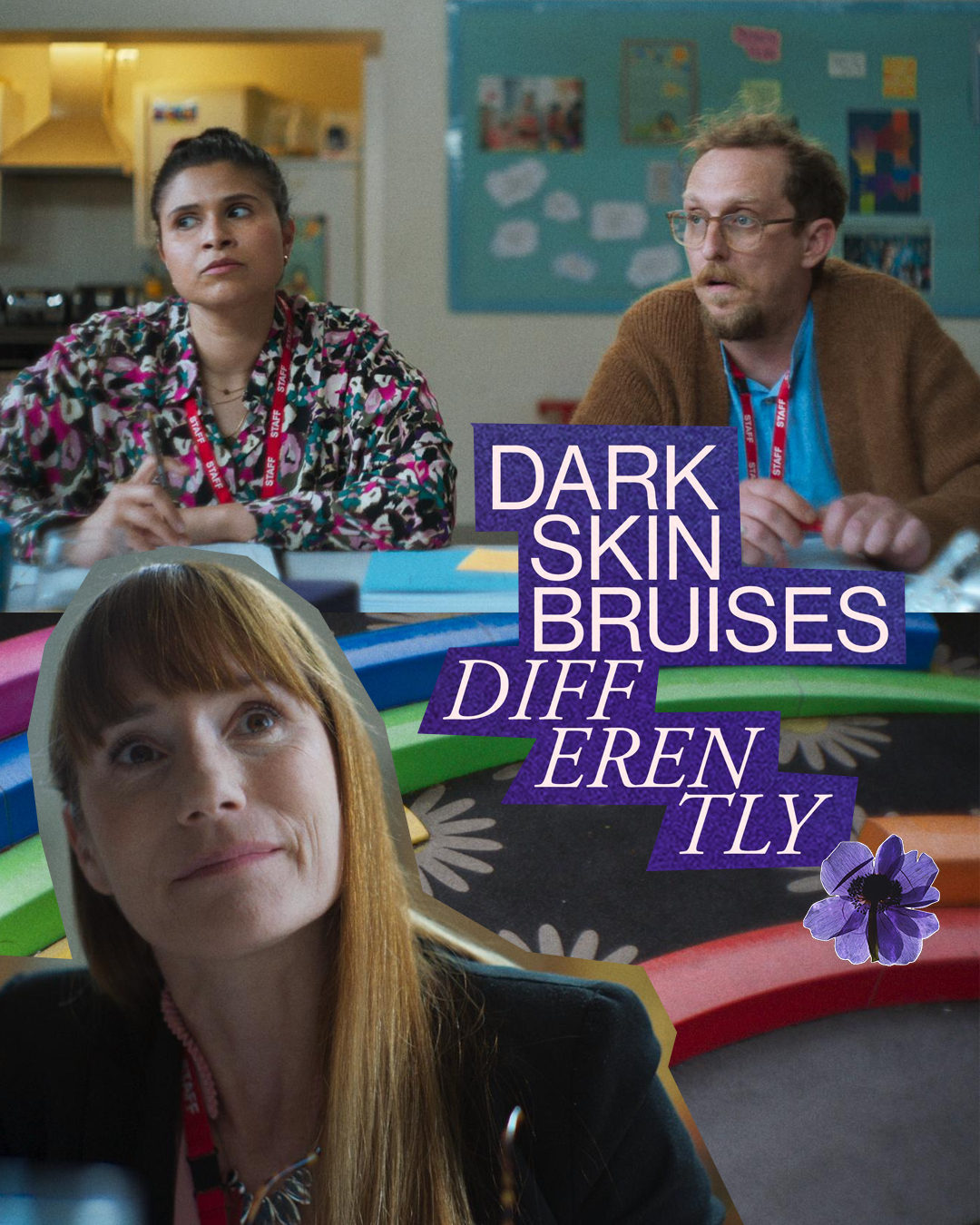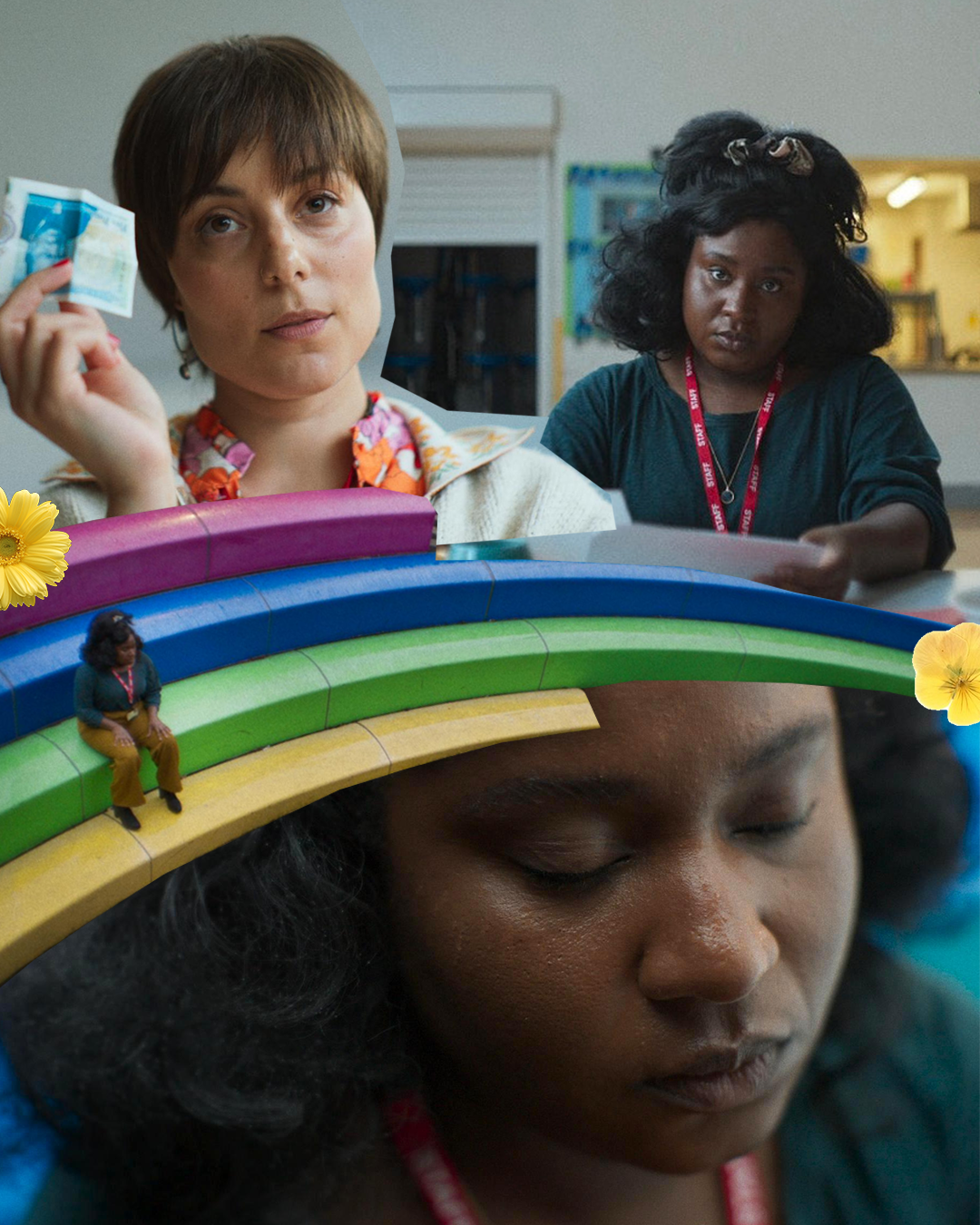Susan Wokoma on Her Short Film ‘Dark Skin Bruises Differently'
Words: Haaniyah Awale Angus
Susan Wokoma wears many hats: most notably as both a screen and stage actor, who you may have seen in BBC’s Cheaters, Channel 4’s Chewing Gum or Netflix’s Enola Holmes series. But alongside her roles that veer across genres such as comedy and drama, she’s also a writer, producer, and now, director.
Her debut feature, Three Weeks, is currently in production, and her short film Dark Skin Bruises Differently screens at the 75th annual London Film Festival in the 'Show Me Who I Am' strand.
In the film Wokoma continuously flexes her well-crafted multi-disciplinary skills, penning the script as well as starring as Ms Lawson, a concerned teacher who finds herself in the midst of a teacher scandal. For a film with limited runtime (just upwards of ten minutes), Wokoma effectively asks her audience what happens when children lie, what kind of children are afforded protection when they lie and why we ignore signs of harm right in front of us. Ahead of the film’s screening, Polyester spoke with Susan about her short and why she took up the mantle of director.
I’m sure you’ve been busy with the selection of Dark Skin Bruises Differently in the LFF, as well as the multi-festival run the film has been on lately. Outside of film, what has the past year looked like for you?
Wow, that is a very big question. If I'm being completely transparent, which I sort of can't help but be transparent, I'd say that I've had a pretty bad year. I lost my mother earlier this year, and I think that’s what’s made me think about childhood. For most of my life, my North Star has been the idea that even if things for me weren't going great, I was so inspired by people and was so inspired by my surroundings. This year, I've realised that’s been the core of how I've been able to stay positive and be inspired. But how do you stay positive and creative when we live in a world that doesn't value positivity or creativeness? I think that's a big question, but the thing is that creativity has survived before. So, yeah, that's the honest truth. I feel like it's totally alright to be that transparent.
Dark Skin Bruises Differently centres around your character, Ms Lawson, who’s accused of favouring a problematic student and faces potential repercussions due to the student's lie. What inspired the short?
Besides my own childhood, it was the Victoria Climbié murder. I think I was about 13 when that happened, and seeing that picture of her where she's in the red cardigan, she's got her hair in bunches, and she just looks like this gorgeous, sweet angel. And you just think she was in so much suffering, and it was missed by so many people. If you go online and you read the case, the list of times that she was seen by health professionals, social workers, and yet nobody kind of just snatched her away from what then happened to her. It's really heartbreaking, and it’s stuck with me ever since then. Once I started exploring becoming a writer, I thought that somebody would write about it. I thought we would have a TV, film or mini series about that story, and it hasn't happened, not really. I guess Dark Skin Bruises Differently is a slight kind of exploration in whether we're ready to explore that specific case, but in terms of how it widely affected this story, it's just about looking at a young girl and how we talk about children, and how we look at innocence, and who is afforded innocence. That kind of abuse and neglect happens to children of all races, as we know in this country, but there is a certain amount of innocence that is afforded white children that isn't afforded black children, it’s so much easier to miss. It wasn't that long ago that we had medical textbooks that said dark skin literally can withstand more pain.
When you talk about the innocence that's not afforded towards black children, I think of specifically the anti-blackness that occurs within the opening scene of the film. It’s obvious that anti-blackness is playing a role amongst the teachers and their perception of Maria. Given our current landscape of politics right now and the difficulties with naming antiblackness and racism what they are, how important was it for you to have those be named in the teacher meeting?
It was kind of going to be the main crux of it, because, as much as Moizelle Olaleye, who plays Maria Reyes, is an amazing performer, I wanted us to be steeped in how she was being spoken about before we see her. It was really important to get that balance right. One of the things that's quite annoying about writing about racism, be it microaggressions or smaller as opposed to riots on the streets, is that by its very definition, you're going to get a Black person faced with kind of white characters. And for me, already, in terms of, just like casting that already puts Black actors in the minority, which I'm not that interested in, but I think that having the Mrs. Begum by the amazing Zainab Hasan, who I just absolutely love, and have been dying to work with all the time, gives us a look into what being institutionalized does to you. There's a bit in the beginning where one of the teachers says, Oh, traditional southeast London family, where have they gone? And you’re left to wonder what they meant by that, what’s been the change in landscape for her, that one thing was the norm, and now this thing is the norm. And why does that sort of breathe a sigh of relief when you see the old thing again? It's that sort of interrogation that people don't do. They just go, you're calling me racist, and their ears close off.
I found it rather interesting that Ms Lawson decided to ask Maria head-on about her perceived lying, giving her the behaviour report instead of talking down to her, as I assume many adults in her life already do. However, given that Maria doubles down on the fact that she was given the money, which lends to an unreliability in what actually happened here, I'm wondering, was that ambiguity purposeful for you to have towards the end?
It's really interesting hearing you say that, because for me, it's not ambiguous. What I love about this film is that in such a small amount of time, you get such different reactions, particularly to that end part. So for me, I'm really interested in these conversations and these takes. I remember we had a screening at the S.O.U.L. FEST, which is also at the BFI and having so many people run up to me and be like, but hang on a minute? But she did, but she didn't give her money. And I'm like, what do you want to believe?
That's what it comes down to: what you think is right, what you think should have happened, as well as your own perception of the truth. With the theme of truth vs falsehood, I wanted to ask about Maria's lying specifically. Ms Lawson presents it to the teachers as a way for her to protect herself and create distance from the much worse truth. When writing the film, was it challenging to tap into that?
No, because as a child who then went on to perform, I know that there’s a period of time where your relationship with the truth becomes a little bit dicey, or it's you just being a child. Every child learns what right and wrong is. You have a journey. You learn what's real and what isn't. I remember there was a girl in my school who would tell everybody that Baby Spice was her sister. That's a lie, but would you turn around and be like, well, therefore you're untrustworthy. Or are you a child who's learning your relationship with like, the truth and fantasy and wishful thinking? I feel that all children, all children of all races, should be afforded that space in that time where they are working out their relationship with the truth. What I feel happens oftentimes with Black children is that there is immediate suspicion. You say one lie, like we sort of say in the short Maria says that her dog died, and that's evidence because she didn't have a dog, so therefore it's evidence that she's, you know, she's destined to be a liar. No, she just lied and said that a dog died. I feel that's really unfair.
This film is your second directing role, and I wanted to know sort of what moment was when you realised you wanted to be a director, and are there any sort of directorial careers you might have studied in preparation for added responsibilities, or ones that inspired you?
I didn't really know that I wanted to direct until I was developing a feature film called Three Weeks. I've been developing it for a very long time, and I was initially encouraged to direct by certain members of the team, and then when I said, yeah, I want to direct it, everyone freaked out, because they're like, whoa, we meant direct something else some other time, not this. I have to give absolute props to my literary agents. I know that's not like a sexy thing to do, but shout out Cathy King and Kate Prentice, because when this kind of eruption of worry happened, they were laughing because in my development contract for this film, they put that I get first refusal to direct. I found it both hilarious and really encouraging, as it meant they saw qualities in me that I hadn't recognised in myself. But ultimately, my experience of really great directors has always been directors who have been performers. They are the best ones, not just because they like actors, which is a really good start. You'll be surprised by how many, not just directors, but how many producers, how many people in film, really hate actors or don't respect actors at all. But I think actors who’ve had an experience of when sets are not great, like a real emotional experience of when sets are not great, understand how to avoid that. All the really great directors I've worked with understand the culture on set, and it doesn't mean they have acted to a professional standard, but just enough to get it.
Three Weeks is currently in production—is there anything you can tell us about how it's going?
What I can tell you is that we have an amazing new team on Three Weeks, including the wonderful team from Erebus Pictures, who I've worked with as an actor. I did a film called Bonus Track with them, and their film, 100 Nights of Heroes, is going to be closing LFF. Helen Simmons, Stephanie Aspin are two absolutely wonderful producers. We also have the amazing Michelle Antoniades, who's the BIFFA award-winning producer of an indie called Sweetheart and Maëva Demurger, who produced Dark Skin Bruises Differently. It's like having a hit team of amazing women on board with Three Weeks, and I'm super excited to work with them.


